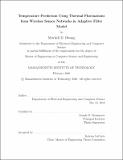Temperature prediction using thermal fluctuations from wireless sensor networks in adaptive filter model
Author(s)
Hwang, Mitchell D.
Download1237419600-MIT.pdf (12.18Mb)
Other Contributors
Massachusetts Institute of Technology. Department of Electrical Engineering and Computer Science.
Advisor
Joseph D. Steinmeyer.
Terms of use
Metadata
Show full item recordAbstract
In many scientific experiments, it is imperative to minimize the unintended effects of variables other than the independent variables. Temperature, pressure, and gas levels are factors controlled to a certain extent using expensive climate-controlling technology, yet the resolution for monitoring their levels is generally low. The downward scaling of communication-enabled electronics in size, cost, and energy provides a potential toolset for tracking such data with high spatial and temporal resolutions. We establish a data collection methodology through a low-cost, small footprint distributed network system of modules that records data in a remote server. The system architecture allows for increased spatial resolutions, demonstrates high precision of measurements, and investigates room dynamics. Modules are fabricated using commercial sensors such as the ESP8266, BME680, and TCS34725. In this paper, we propose a temperature prediction model using adaptive filter methodologies to learn the relationship between thermal fluctuations at distinct locations within a lab environment.
Description
Thesis: M. Eng., Massachusetts Institute of Technology, Department of Electrical Engineering and Computer Science, February, 2020 Cataloged from student-submitted PDF of thesis. Includes bibliographical references (pages 97-98).
Date issued
2020Department
Massachusetts Institute of Technology. Department of Electrical Engineering and Computer SciencePublisher
Massachusetts Institute of Technology
Keywords
Electrical Engineering and Computer Science.